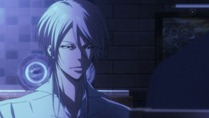 |
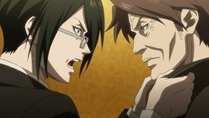 |
 |
It seems as if the best course of action at this point is to accept Psycho-Pass for what it is rather than worry about what it isn’t, especially as what it is is a pretty solid show all things considered.
I think the gloves are pretty much off now as far as what Urobuchi Gen is trying to do in Psycho-Pass. Make no mistake about it – this series is a broadside aimed squarely at the heart of the Japanese national identity, no less and no more. There are elements of more overtly restrictive societies like North Korea in the scenario, especially once talk turns to food production, but that’s just Gen saying that the difference is only a matter of degree.
Japanese history is a study in isolationism and xenophobia, waxing and waning in turn. For most of that history, in fact, Japan has been almost entirely isolationist in its national policy – and before it was socially developed enough to have a national policy, by practical necessity. Outside influences always managed to slip through, humanity being what it is (Buddhism, for one) but the Xenophobic side of the national character has never totally disappeared, even now. It’s reflected in the propaganda from the current prime minister and it’s reflected in that distinctly Japanese notion that no one else can quite understand Japan, no matter how long they live here. Psycho-Pass presents a Japan that’s sort of a Nirvana for the Japanese isolationist – dependent on no other nation for food, a society entirely controlled by dispassionate bureaucracy where subservience of the individual to the needs of society isn’t just a character trait, but the basis of existence. But one man’s Nirvana is another man’s Naraka, of course, and that’s where the likes of Makishima come into the picture.
This all makes for some fascinating intellectual mill grist (hyper-oat variety) and as is so often the case, Gen anime seem to be at their best when they’re showing two or three people quietly talking to each other. The downside of all this of course is that everything with Gen is about making a point – a point about society, or the depravity of human nature – and as a result, his characters never seem to exist completely in their own terms. It’s not enough for the lives of the characters to be the focus in their own right: they must always serve his greater purpose. For me, the impact of this is an emotional disconnect from what happens to them because they never fully make the transition from the page to the screen as real people. So we see the same patterns repeat themselves as each cast member fulfills their assigned role – Kougami figures everything out from a single bread crumb. Akane wrestles with self-doubt and looks adorable. Gino rages at his intellectual and moral impotence. And Makishima looms over all of them like a spectre, mocking both the society he loathes and the ones who seem determined to defend it in spite of mounting evidence of its depravity.
But again, I should take my own advice and accept all that, because 19 episodes in Psycho-Pass (and Gen-san) certainly aren’t going to change. And viewed as the intellectual exercise is it, this is still a pretty interesting place to be. I welcome the return of Professor Saiga to the fold, because he represents an interesting outlet for ideas (and I love his gorgeous, “Falling Water” house). As he and the fugitive Kougami dine on fresh eggs, vegetables and (gasp!) real coffee, they discuss how 99% of the food in Japan comes from genetically modified “hyper-oats”, grown completely without the benefit of human hands with the help of drones and benign viruses. The irony here is operating on several levels – it’s not just about the food, but about the people of Japan, similarly isolated and vulnerable because of their homogeneity. If the hyper-oats make a convenient target for Makishima’s final assault on Sibyl, they also make a convenient symbol for Gen’s final attack (for this series) on Japanese society.
Saiga represents a sort of idealized embodiment of the anti-establishment intellectual – Frank Lloyd Wright house, back-to-nature lifestyle, stylish sweater and glasses, indoor scarf-wearing, fully stocked wine cabinet. And he’s connected to the old-fashioned 2chan-style boards that exist as a place for the discarded hipster detritus of the new Japan to vent their frustrations with Sibyl – their discussions taking place on foreign servers (an allusion to the likes of Iran and North Korea, no doubt) and so low-tech that they fly under Sibyl’s radar. He’s a very entertaining character, and his discussions with Kougami have been some of the best moments in the series – I especially liked the moment when he encouraged Kougami to imagine Makishima sitting at the table with them. What Saiga does – and Kougami too, for that matter – amounts to magic, pretty much. It’s deduction in service to plot, not real detective work – but it’s undeniably fun to hear Saiga spouting Weber and Kou bouncing it back with threats of Bentham and Swift.
The deeper point here is that Saiga is right, Kou and Makishima are very much alike in many ways. This is something that Makishima is quite comfortable with and Kougami is not, and in fact it seems to me that Kougami is so intent on killing Makishima largely so that he doesn’t have to be mocked by the existence of someone so uncomfortably close to a soul-mate, yet so much a ruthless terrorist. Saiga knows this too, and it’s clear he sees Kougami’s single-minded obsession with killing Makishima for what it is – and in fact would love the chance to interview him himself. He helps Kou out of a sense of loyalty, and because he knows Makishima is the most dangerous man in Japan. But there’s a deeper irony here, and it’s that two men who – if anyone does – should have both the ability and inclination to despise Sibyl and work against it are instead acting as its main defenders. Makishima is indeed dangerous and a serial murderer – not quite an anarchist in the conventional sense, as Saiga says, but certainly an insurrectionist of the first order. The problem, though, is that in the long view it’s hard to imagine the country wouldn’t be better off if he succeeded. Kougami and Saiga are interesting men, but they’re fighting the wrong fight for the right reasons – and this disconnect is one of the more interesting elements Gen has attached to Psycho-Pass.
What seems to be the predictable conclusion – we’ll see – is that it’s Akane who ends up being the destruction of Sibyl. That’s certainly been my stated view for months – that she would be the downfall of Sibyl from the inside, with her own quasi-Makishima like ability to confound the system, without all that nasty killing. Sibyl’s decision to try and recruit her seems almost certain to be its fatal mistake, and it seems likely we’ll see Akane GAR-moe moments in true Arthur/Saber style in the finale as she kicks Sibyl’s ass. That’s all well and good, but of more interest will be the confrontation between Makishima and Kougami – the real main characters – and the ultimate resolution between Gino and Masaoka. Though minor characters in the big picture (Masaoka especially is criminally underutilized) their relationship is the most interesting in the show in purely human terms. Gino has only become sympathetic himself as the depth of his frustration has become clear – he’ll never be the man Kougami and Masaoka are, and he knows it. He lacks both their insight and their clarity of purpose (sweet irony, given how Sibyl views them) and is forever being “left behind” to use the words he uses himself this week. Masaoka clearly still loves his son and is trying to save him – and Akane too – but the only way he can see Gino saving himself is be recusing himself from events altogether. It’s a sad thing that he has no faith in his son’s ability to actually make a difference, but even sadder in that nothing we’ve seen from Gino would make us question that judgment. There are so many characters in the series that seem targeted for bad ends – especially in a Gen series – that it seems well within the realm of possibility that only Akane among the main cast will survive the carnage to come.
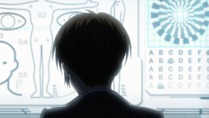 |
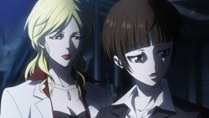 |
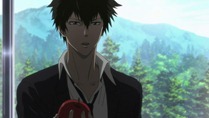 |
 |
 |
 |
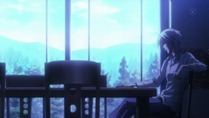 |
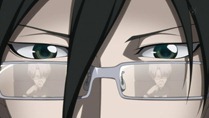 |
 |
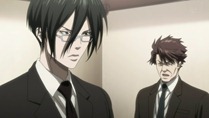 |
 |
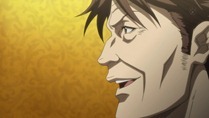 |
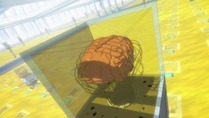 |
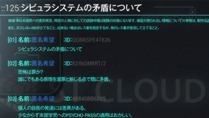 |
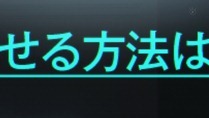 |
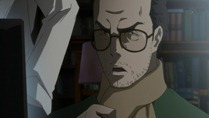 |
 |
 |
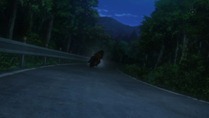 |
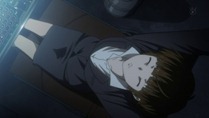 |
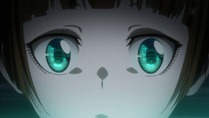 |


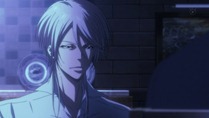
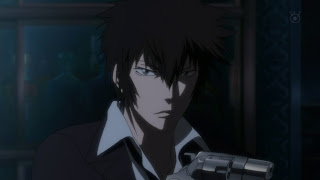
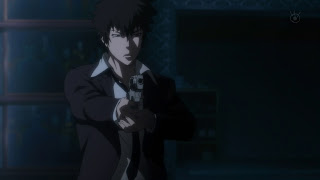
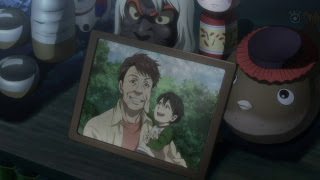
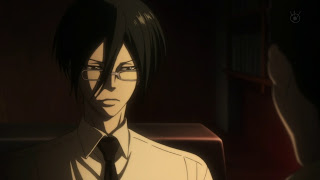
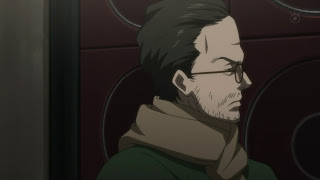
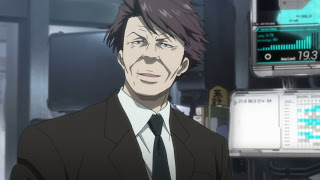
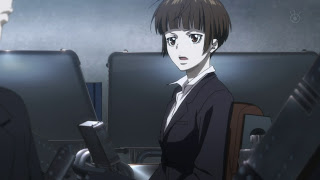


dirty water imp
March 2, 2013 at 9:13 amThe coda you suggest seems less than inviting, but all signs point to it. Many scripts seem to end up variations of The Billy Mumphrey Success Story.
admin
March 2, 2013 at 9:28 amYou mean that simple country-boy – you might say cock-eyed optimist – that got himself mixed up in the high-stakes game of world diplomacy and international intrigue?
Awet M
March 2, 2013 at 8:44 pmEnzo, I think you've read one too many Billy Mumphrey stories. 😉
hoiut
March 2, 2013 at 9:19 amI like the nationalist angle you've introduced in your analysis here. From the lens of integration vs isolation, the main themes underlying recent developments seem to take on a different hue. And it's not Baby Blue, according to my hue scanner*.
I suppose it was inevitable that a real discussion on insurrection and revolution cropped up by now. It's probably also no coincidence that Makishima is seen gripping his Red Book in the intro, which he later throws out of a transport aircraft into the heart of the city. This after his equally ironic speech about being a common, everyday man who wishes to "wake up" society to the need to lead a common, everyday life in a common, everyday way.
Terrible, I know. Call me a hue Jass if you will.
admin
March 2, 2013 at 9:27 amHey – you got a Benny Hill reference in my Seinfeld reference!
dirty water imp
March 2, 2013 at 9:21 amYes, that very same Mumphrey — and so they made him an admiral for his effort.
Nayrael
March 2, 2013 at 1:04 pmI don't think they want her brain… yet. They seem to have been looking for Ginoza's replacement (whatever his real role was supposed to be) and they decided on Akane… something which kinda shocked the brain who was currently residing in the Chiefborg (if I had to guess, they understand that revealing the truth to Akane would put them at risk).
admin
March 2, 2013 at 2:20 pmWhy would they need to reveal the truth to Akane just to get her to replace Gino? He certainly doesn't know the whole truth.
ハドソン
March 2, 2013 at 8:00 pmI really enjoy the thought you put into your posts, Enzo, but I can't help but think that you're off-base in your discussion of Japanese nationalism — not in how it applies to "Psycho-Pass" (you're spot-on, there), but in how it developed in Japanese history.
The "xenophobia" we see today in Japanese culture is mostly a product of nationalist scholastic trends in the mid- to late-Tokugawa period combined with the patriotism-building efforts of the Meiji government, all allowed to develop over the course of the Taishō and Shōwa periods. Prior to the founding of the Tokugawa bakufu, Japanese culture, religious life, and polity were all open to foreign influence! Heck, one can even argue that Tokugawa-period restrictions on foreign (read: Western) trade weren't so much the product of cultural xenophobia as they were fears of European encroachment on Japanese economic policy and sovereignty, à la Qing China.
Buddhism most certainly did not "slip into" Japanese culture — Prince Shotoku and Empress Suiko of the Asuka period actively supported the spread of Buddhism following its introduction to the Japanese court by Korean envoys. Its growth and fragmentation throughout the premodern period was a pretty good example of how Japanese monk-priests and scholars struggled to incorporate Chinese, Indian, and Korean thought into practice on the ground. Confucianist thought also developed along similar lines in Japan; Itō Jinsai, Ogyū Sorai, and Motoori Norinaga are all good scholars to study if you're interested in learning more about how they grappled with the issue of Japanese identity and its dependence on foreign cultural imports. (Norinaga and other kokugaku scholars, in fact, were the first to set forth the idea of a uniquely "Japanese" identity free of foreign influence.)
I think that the idea of Japan having always been "xenophobic" in some form just perpetuates the myths of Japanese ethnic and cultural homogeneity. What makes it worse is that it's incredibly easy to buy into those myths — especially if you're living in Japan in this current political climate.
admin
March 3, 2013 at 12:55 amThis isn't really a Psycho-Pass discussion, but I really don't see how anything you've written contradicts anything I've written.
Buddhism was actively supported by people like Shotoku for certain (anyone who's been to Horyu-ji could tell you that) once it was here. But it still more or less "slipped in" from Korea in the first place. And it's always met a certain amount of resistance from factions of the power structure that considered it an outsider religion. Biut that's just one example.
As I said in my post, pre-Tokugawa isolationism wasn't always a function of policy so much as necessity – Japan is an island, and thus in terms of pure practicality (especially as you get back to the Asuka period and earlier) it had limited exposure to foreign influences as compared to most nations (so did Britain, for that matter). Royals and powerful religious figures met lots of people from Korea and China – the average Japanese commoner did not. And I think that's significant in the evolution of the Japanese identity.
Highway
March 3, 2013 at 1:40 amI actually thought that this episode's performance by HanaKana in talking about Kougami and herself was one of the best I've heard from her. Someone who has a reputation for so many flat, seemingly emotionless characters just did a great job with the self-crisis of actually fearing themselves being emotionless, and put more emotion in just those few sentences than all the yelling you could get.